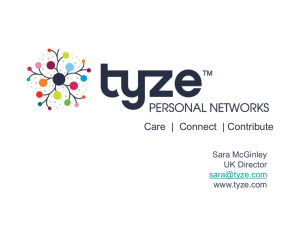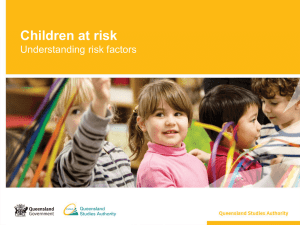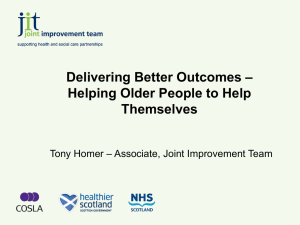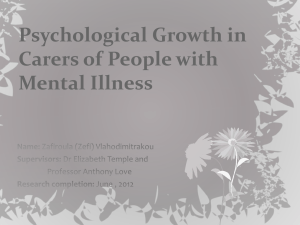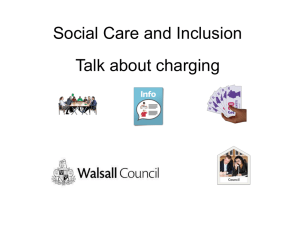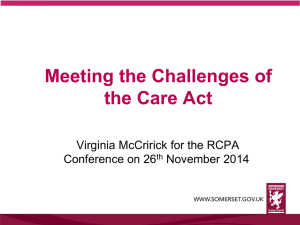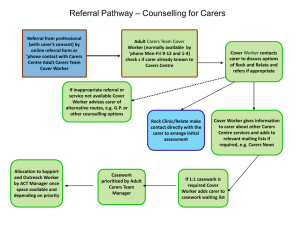Developing the Triangle of Care in Somerset
advertisement
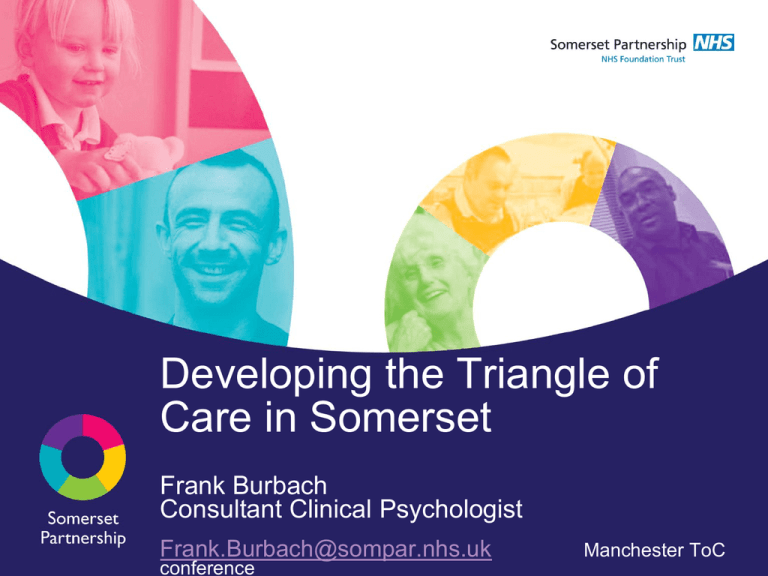
Developing the Triangle of Care in Somerset Frank Burbach Consultant Clinical Psychologist Frank.Burbach@sompar.nhs.uk conference Manchester ToC INTRODUCTION: Somerset A Rural County; Population 520,000 Integrated Mental Health, Social Care and Community Health Foundation Trust 4 Service Areas © Burbach 2013 Services focused on the needs of families across 4 service areas FT clinics FT clinics F.I.Psychosis F.I. Psychosis Carer’s service Carer’s service F Inclusive Practice F Inclusive Practice ToC FT clinics F.I. Psychosis Carer’s service F Inclusive Practice © Burbach 2013 FT clinics F.I. Psychosis Carer’s service F Inclusive Practice FAMILY/ CARER SERVICES IN SOMERSET 1. Specialist Family Services Family Therapy clinics - NICE Guidelines Family Interventions in Psychosis Services - 1999 NSF: Early Interventions Service - 2001 NICE Guidelines for Schizophrenia 2. Carers’ Needs Assessment Services - 1999 NSF: Carers Assessments and Care Plans (Standard 6) 3. Family - Inclusive mainstream clinical practice - © Burbach 2013 2002 DoH Developing Services for Carers and Families of People with Mental Illness NICE Guidelines recommend partnership working families and carers with WORKING WITH FAMILIES / CARERS IN SOMERSET Lack of Family/Carer involvement and little family work for psychosis despite a number of family therapy clinics 1996-2000: Developed Family Interventions Service (4 teams) 2002 Carers Services team created 2002 Trust Strategy to Enhance Working Partnerships with F & Carers 2002 Families and Carers Steering Group created 2005 Carers Participation Group created 2006-2008 In patient staff Family Inclusive Practice training programm 2007 Carers Charter 2007-2011 Family Liaison Service developed 2013 Triangle of Care Steering Group created © Burbach 2013 WORKING WITH FAMILIES / CARERS IN SOMERSET Lack of Family/Carer involvement and little family work for psychosis despite a number of family therapy clinics 1996-2000: Developed Family Interventions Service (4 teams) 2002 Carers Services team created 2002 Trust Strategy to Enhance Working Partnerships with F & Carers 2002 Families and Carers Steering Group created 2005 Carers Participation Group created 2006-2008 In patient staff Family Inclusive Practice training programm 2007 Carers Charter 2007-2011 Family Liaison Service developed 2013 Triangle of Care Steering Group created © Burbach 2013 TRUST STRATEGY TO ENHANCE WORKING PARTNERSHIPS WITH CARERS & FAMILIES Vision - A Family/Carer Friendly Trust The Somerset Partnership Trust will strive to respond to the needs of carers and families in all parts of the service. This entails having a social network perspective to all assessments and interventions provided by our staff and the involvement of families and carers in service delivery wherever possible. (2002/2010) © Stanbridge & Burbach 2012 Focus of steering group • Improving information/ education and support services for carers e.g. website, ward packs, assessments, groups, breaks. • Increasing the involvement of families/ carers in assessment/ treatment/ CPA process. • Raising staff awarenes and skills in working with families e.g. Staff training programme. • Influencing/ developing Trust policies and guidelines e.g. Carers Charter; operational policies; confidentiality guidelines; guidelines for obtaining information from © Stanbridge & Burbach 2012 families. WORKING WITH FAMILIES / CARERS IN SOMERSET Lack of Family/Carer involvement and little family work for psychosis despite a number of family therapy clinics 1996-2000: Developed Family Interventions Service (4 teams) 2002 Carers Services team created 2002 Trust Strategy to Enhance Working Partnerships with F & Carers 2002 Families and Carers Steering Group created 2005 Carers Participation Group created 2006-2008 In patient staff Family Inclusive Practice training programm 2007 Carers Charter 2007-2011 Family Liaison Service developed 2013 Triangle of Care Steering Group created © Burbach 2013 INPATIENT TRAINING TOPICS Days 1 & 2 Day one Carer’s story and discussion. Introduction to National Policy and Trust Strategy for Partnership Working with Families and Carers, including exercises discussing current practice and personal/ organisational obstacles Information sharing and confidentiality. Day two Introduction to systemic thinking (case scenarios; mobile) and interactional cycles. Carers Assessment Worker and EPR demonstration: assessments and resources. The initial family meeting, (including role-play). Develop Action Plan. © Stanbridge & Burbach 2012 INPATIENT TRAINING TOPICS Day 3 Day Three Discussion of team’s action plan. Feedback from case-note audit Genograms. Young Carers video and discussion. Clinical discussion. © Stanbridge & Burbach 2012 Overview of 4 inpatient unit audits pre, post and 1 year follow up from training (%) PRE POST 1 YEAR 1. Carer registered in Electronic Patient Record? 22.5 42.5 42.5 2. Family or friend recorded in ‘contacts’ in EPR? 90.0 95.0 97.5 3. Reference in ICPA to carer need, roles or 37.5 82.5 77.5 contribution to care? (including: family history, support network,carer’s views etc.) 4. Carer involvement in relapse prevention plan 5.0 17.5 15.0 5. Any carer ‘responsibility’ for issues identified 12.5 15.0 25.0 as problems within care plan? 6. Systemic issues identified & referral to specialist services a. Carer’s assessment 15.0 42.5 37.5 © Stanbridge & Burbach 2012 b. Carer’s support group/ education group 5.0 32.5 PRE & POST TRAINING SURVEY • Confidence about skills for working with families Not confident 1 2 Pre: 5 22 2.57 Post: 0 2 2.90 3 28 20 Very confident 4 5 6 0 (N=61) Ave= 28 4 (N=54) Ave= Staff recording themselves as ‘confident’: Pre training = 10% Post training = 57% • In the past month, how often have you sat in a room with the client and family members, to discuss issues? Averages Pre training: 2.35 (N=61) Post training: 2.90 (N=53) © Stanbridge & Burbach 2012 ATTENDANCE ON INPATIENT STAFF TRAINING Total 5 unit attendance from an establishment of 81 trained staff: No. % Attended days 1/2: 66 82% Attended day 3: 57 70% Attended some training: 72 89% Attended all training: 52 64% Subsequently the training has been repeated on all the acute wards. A 1-Day course has been provided to 75 Nursing Assistants and Reception staff. © Stanbridge & Burbach 2012 Good Practice Guidelines for Inpatient Units and Community Teams on Obtaining Information from Families and Carers (2008). The proactive obtaining of information from families and carers needs to be a core part of the assessment process and systematically included in the development of risk management, care and relapse plans. This is particularly important in situations where only a limited history is otherwise available. This information should be recorded in the appropriate section of the Care Programme FAMILY LIAISON MEETINGS: Data from Adult Wards Beech Ward Dec 07 – 18th Jan 11 Rydon Ward Mar 10 – Mar 11 Rowan Ward June 10 – June 11 398 321 347 Total No. of admissions family offered a meeting 228 (57%) 71% of families available 187(58%) 77% of families available 124 (36%) 53% of families available Total No. of family meetings held 157 (9 over phone) 39% of admissions 49% of families available 69% of families offered a meeting 75 (1 over phone) 23% of admissions 31% of families available 40% of families offered a meeting 42 (2 over phone) 12% of admissions 18% of families available 34% of families offered a meeting Total No. accepted 80% (182/228) 52% (97/187) 64% (79/124) Initial contact in 24 hrs 67% (155/233) 75% (130/175) 73% (183/251) 44% 53% 58% Total No. Admissions (where recorded) Families seen in 7 days Family Liaison on Phoenix Ward Staff Experience Survey(N=16) Most staff reported that their experience of the family liaison work had been positive, with staff thinking more systemically and involving families more in their clinical practice. Furthermore, staff reported that family meetings were being offered routinely as part of the admission process and they were feeling more confident in communicating and sharing information with families. Family Liaison Client and Family Feedback 3 Adult (Beech, Rowan, Rydon) and 2 Older People’s (Cedar, Magnolia) Inpatient Wards (December 2007 - June 2010) • 268 feedback forms were returned from 153 Family Liaison Meetings (about 38% of total, taking the estimate of 400 meetings). • All family members and all clients described helpful aspects. 34 (17%) family members and 13 (20%) clients also described unhelpful aspects. • Common “helpful” themes included: being heard/feeling supported, receiving information and advice (support for carers, client’s care, ward/service), communicating with each other, involvement in client’s care/Involving Friends and Family, atmosphere/approach, presence of facilitator, questions answered, making contacts, planning care, and resources. Family Member Feedback: Staff who were “prepared to listen and answer our questions” “The opportunity to elaborate on the background to his illness” “Exploring possible support methods. Getting specific information and help” “Knowing who to turn to if help is needed” Client Feedback: “Finding out what support is available for my relative” “A chance to talk over problems and find solutions Monitoring the use of the Mental Health Act (2009/10) Care Quality Commission. (1) Involvement of family and carers “ One example of good practice is Somerset Partnership N.H.S Foundation Trust which has for some years adopted a strategy to enhance working partnerships with the family and carers.This involves staff training and a family liaison project designed to increase the number of face -to -face meetings between staff, families and carers on inpatient wards and to hold such a family meeting within seven days of a patients admission ”. (page 58) Monitoring the use of the Mental Health Act (2009/10) Care Quality Commission. (2) “The project appears to have worked well. These meetings are now a routine part of the admission process and there has been very positive feedback from families, carers and patients. This is an excellent way to ensure that aftercare planning is started from the point of admission. This, in turn could help to avoid future re admission.We commend this project as a model for other services”. (page 58) . SOMERSET FAMILY SERVICES (work in progress…) v. FI or FT iv. Consultation iii. Routine FI / Extended Family Liaison ii. Family Liaison i. Family Inclusive Practice (Triangle of Care) © Burbach 2012 ‘Stepped Care’ models and the ‘Sufficiency Principle’ Increasing recognition that it is not necessary (or feasible) to offer in-depth interventions to all families. The ‘sufficiency principle’ – by providing a range of family based services the needs of clients and family members can be met with the least intensive intervention. © Burbach 2012 To Conclude • Families can benefit from a range of support services • Incrementally add family services throughout the care pathway • Good relationships between carers, staff keen to promote working with families and managers (not money) is the key • Link your service development initiatives to current policy initiatives such as the Triangle of Care! Thank You © Burbach 2013 PUBLICATIONS: FAMILY INCLUSIVE PRACTICE © Stanbridge,R. and Burbach,F. (2004) Enhancing Working Partnerships with Carers and Families in Clinical Practice: A Strategy and Associated Staff Training Programme. Mental Health Review.9:4 32-37. Stanbridge,R. and Burbach,F. (2007) Developing Family Inclusive Mainstream Mental Health Services. Journal of Family Therapy. 29: 21-44. Stanbridge,R. and Burbach,F. (2007) Involving carers Part 1: Including carers in staff training and service development in Somerset,U.K. Chapter 5 in : Families as partners in care:A Guidebook for Implementing Family Work. Toronto. Worldwide Fellowship for Schizophrenia and Allied Disorders. Burbach, F. and Stanbridge, R. (2008) Training to Develop Family Inclusive Routine Practice and Specialist Family Interventions in Somerset. Journal of Mental Health Workforce Development Vol 3:2 23-31. Stanbridge,R.,Burbach,F.,and Leftwich,S. (2009) Establishing family acute inpatient services: a staff training programme in Burbach inclusive 2013 PUBLICATIONS: FAMILY INCLUSIVE PRACTICE • Leftwich,S., Carter,K., McIver,C. and Stanbridge,R. (2011) Facing the family: the Family Liaison Service in Somerset, three case examples. Context 114: 40-44. . • Carter, K. (2011) Family Liaison project in an adult acute inpatient ward in Somerset. Mental Health Practice Vol 14:8, 22-25. • Stanbridge,R.I., Burbach, F.R., Rapsey,H.S., Leftwich,S.H., & McIver,C.C. (2012) Improving partnerships with families and carers in older people’s inpatient mental health services: a staff training programme and family liaison service . Journal of Family Therapy (early view). • Gore,S and Stanbridge, R. (2012) Families’ views on the Family Liaison service on mental health wards in Somerset. Context,121: 25-32. . • Stanbridge, R.I. (2012) An evaluation of the Family Liaison Service on inpatient psychiatric wards in Somerset, UK. (Mental Health Review Journal, Vol 17(2). © Burbach 2013 Referenced in National Publications Our work in developing services for families in Somerset has been specifically acknowledged and described in the following national publications: Simpson,A. and Benn.l.(2007) Scoping exercise to inform the development of a National Mental Health Carer Support Curriculum. DOH/ City University, London. http://www.citypsych.com/docs/Carersfinal.pdf Current practice, future possibilities (2007) Association of Family therapy and Systemic Practice in the UK. www.aft.org.uk Social Exclusion Task Force (2008) Think Family: a literature review of whole family approaches. London. Cabinet Office.http://www.cabinet-office.gov.uk./. Family Friendly UK: Making it happen (2009) Association of Family therapy and Systemic Practice in the UK. www.aft.org.uk Preventing suicide: A toolkit for mental health services (2009) National Patient Safety Agency. www.nrls.npsa.nhs.uk. Triangle of Care. Carers included: a guide to best practice in acute mental health care. (2010) NMHDU & Princess Royal Trust for Carers Care Quality Commission (2010) Monitoring the use of the Mental Health Act in 2009/10. Care Quality Commission. © Stanbridge & Burbach 2012
